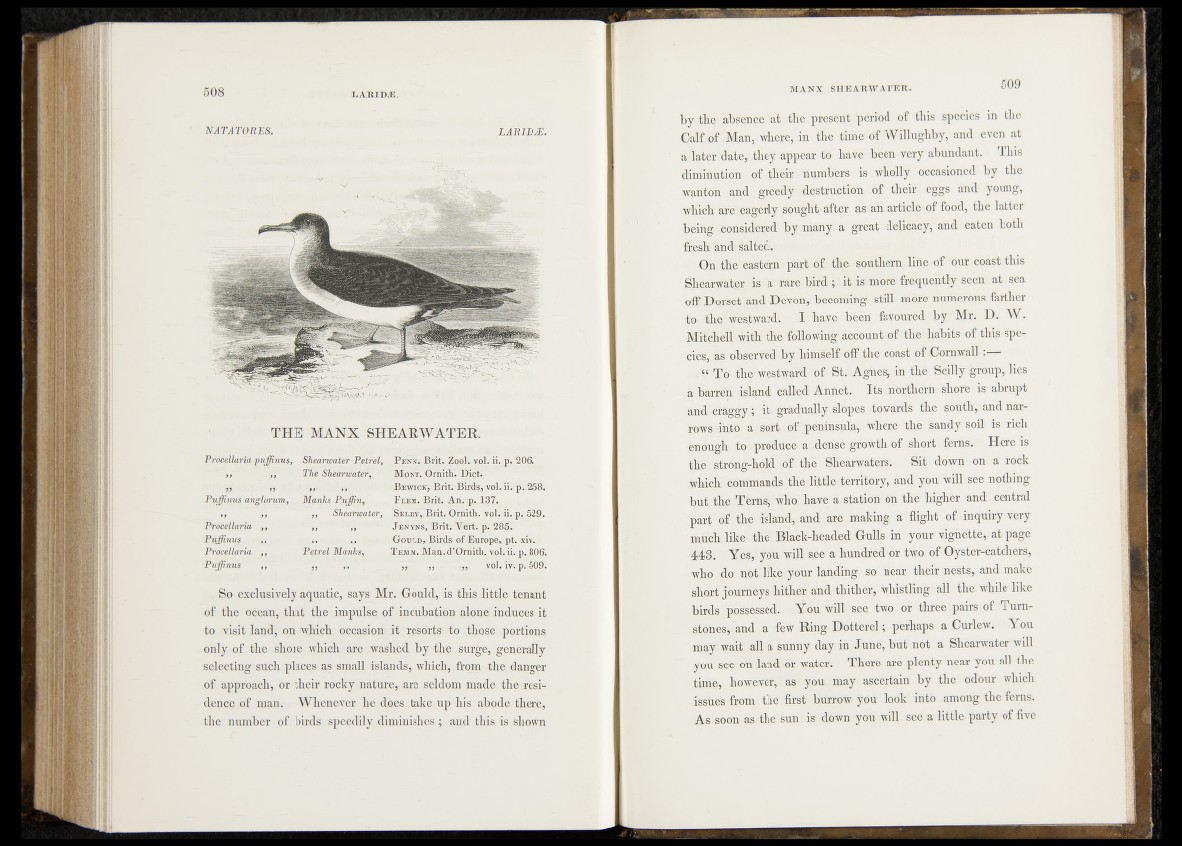
NATATORES. LARIDJÉ.
IgSglp
T H E MANX SH EA RW A T ER .
Procellaria puffinus,
• f f ' . '
Puffinus anglorum,^
Procellaria ,,
Puffinus ,,
Procellaria ,,
'puffinus .
Sluarwater Petrel, P i nn. B ii t . Z o o lA ^ ’ii. p . 2 0 ^ , ■
The Shearwater, M ont. O rh itn . Di@tl
■ ‘ ,, - Bewick? Briti'BlirthSJ.ivol. ii; |f?i258.
Manks Puffin, F be m. B ri t . , A,n. 137.
Shearwater,) ^ eLby, Brit; 529.
,, „ Jenyns*;- Brlt/Vert. p; %!%?'■''*
HR H HHRR (Jqto-p,,Birds of; Europe,jpt*. xiv.
Petrel Manks., . I emm. Man.d’Orttith.-vol.ii. p. §06.
p ,, ' ' „ - ~y,’ in^T r iv . p.P09.
So exclusively aquatic, -says Mr. Gould? is lips little tenant
of the ocean, that the impulse of incubation alone induces it
to visit land, on ■which occasion it resorts* to' those portions
only of the shore which are washed by the surge, generally
selecting such places as small islands? which, from the danger
of approach, or their rocky -nature, are seldom made, the residence
of man. Whenever he does take up his abode there,
the number of birds speedily diminishes; and this is shown
by the absence at the present period of this species in the
Calfpf Man,,where, in the time of Willughby, and even at
a-Mer 'date^key appear to have been very abundant. This
diminution . of their numbers is wholly occasioned by the
wanton,- and greedyi'gdéstruction of their eggs and young,
which are eagerly sought after as an article of food, the latter
blèmg/honsidéred by many ’a great delicacy, and eaten both
fresh- and salted-. ’ .
- On.the eastern part of the southern line of our coast this
Shearwater is a rare bird ;:• it is more frequently seen at sea
off Dorset jand Devon, becoming still more numerous farther
$>,, the* westward. Ehave, been favoured by Mr. D. W .
Mitchell-with th e following a c c o u n ts the habits of this spe-
eiesy as observed.by himself off the coast of Cornwall :
To the westward off St. Agnes, in thé Scillygroup, lies
a barren island called* Annet. Its northern shore is abrupt
and craggy.; it- graduallslopes-. towards the south, and nar-
ro#sr4nto a sort, of .peninsula, where thé sandy soil is rich
_ Enough to produce a dense growth of, short ferns. Here is
the rhèlênghold of the Shearwaters. Sit-down on a rock
which'lcommands thelittle territory, and you will see nothing
but. the Terns, who have a station on the higher and central
part of the island, and are making a flight of inquiry very
much like the Black-headed Gulls in your vignette, at page
448. Yés^ you-will see a hundred or two of Oyster-catchers,
who do not like your landing so near their nests, and make
short journeys hither and thither, whistling all the while like
birds possessed.' You will see two or three pairs of Tum-
' stones, and a few Ring Dotterel; perhaps a Curlew. You
may wait all a sunny day in Juhe, but not a Shearwater will
you see on land or water. There are plenty near you all the
time, however, as you may ascertain by the odour which
issues from the first burrow you look into among the ferns.
As soon as the sun is down you will see a little party of five